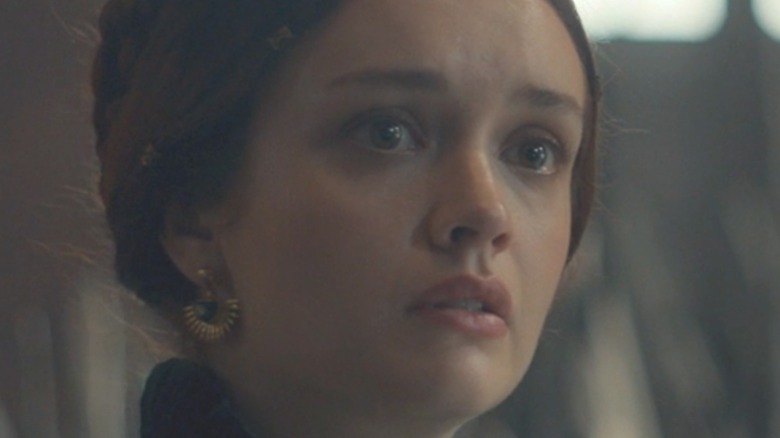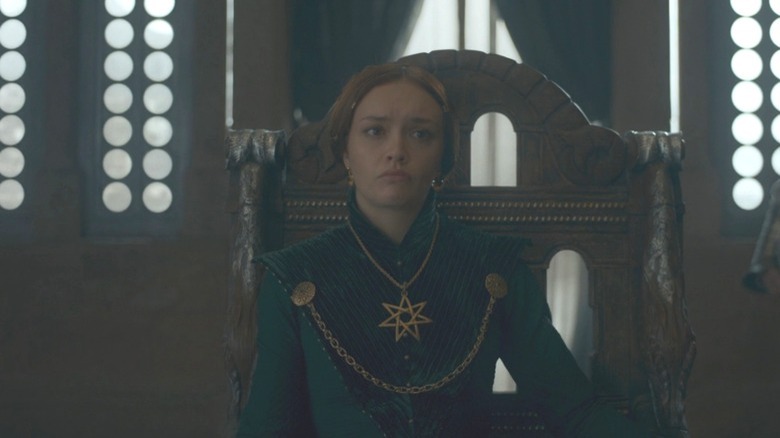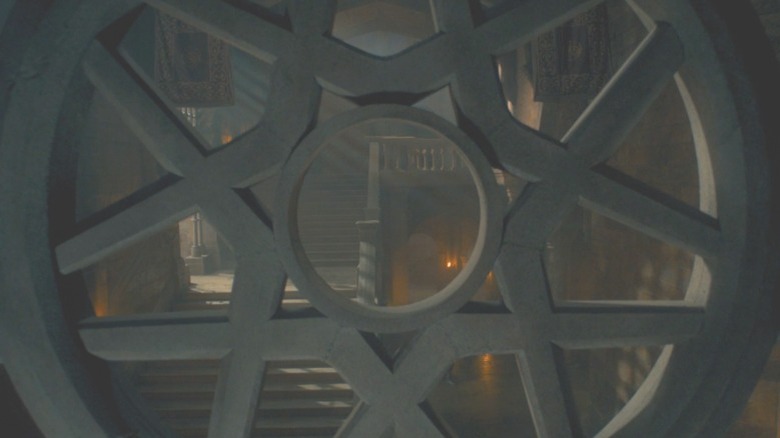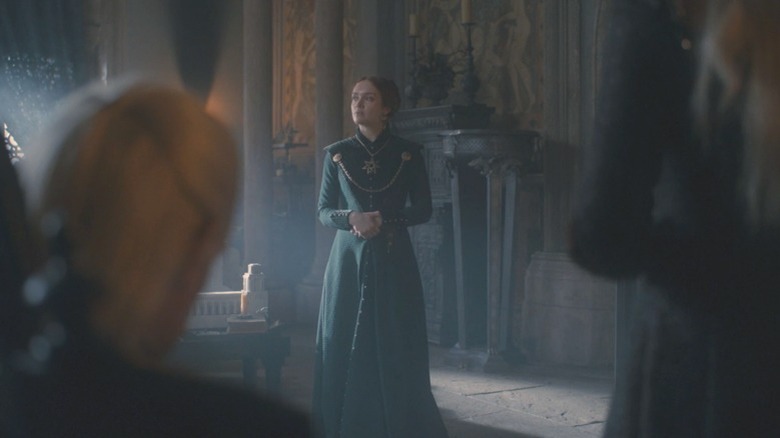Why The Religion Of The Seven Is So Important On House Of The Dragon
Religion plays a big part in both "House of the Dragon" and its predecessor show, "Game of Thrones." Although there is one dominant religion throughout most of Westeros, there are still other forces at work that constitute a full-blooded religion like the Old Gods, The Many-Faced God of Death, or the mysterious Lord of Light. Just think of when Jon Snow (Kit Harington) is made to take the Night's Watch vows, and he is given the choice between swearing his oath before "The Seven" or the "Old Gods" — represented by the bleeding Weirwood trees that dot the landscape.
"Game of Thrones" also sees some rather startling developments regarding the religion known as The Seven, involving the rise of the faith militant and a figure known as the High Sparrow (Jonathan Pryce). This comes about when Cersei (Lena Headey) overplays her hand in an attempt to foil the Tyrells — though this backfires spectacularly. It leads to Cersei detonating a huge cache of wildfire below the Sept of Baelor, which is a famous church within the religion. Considering the ebb and flow of religions in Westeros, it seems like "House of the Dragon" sets the stage for religion to once again be used as a pawn in the great game of politics — but how and why?
The Faith of the Seven existed before the Targaryens arrived
According to Game of Thrones Wiki, the religion of the Seven is actually considered a monotheistic belief system, with one god and seven different aspects. These have been referenced in both "Game of Thrones" and "House of the Dragon" in curses, prayers, and songs, like when people say "Seven Hells" as an expression of shock, when Sansa (Sophie Turner) sings a song to calm down her fellow ladies in waiting during the siege of King's Landing by Stannis (Stephen Dillane), or when a humble farmer prays over a meal with the Hound (Rory McCann) and Arya (Maisie Williams).
So what do the aspects of the Seven represent? There are three aspects with a male connotation, three with a female, and one that is androgynous. These aspects are The Father, who represents justice and judgment, The Mother, who represents mercy and fertility, The Maiden, who represents love and purity, The Crone, who represents wisdom, The Warrior, who represents strength and courage, The Smith, who represents creation and skills, and The Stranger, who represents death and the unknown. As reported by a Wiki of Ice and Fire, the Faith of the Seven existed long before Aegon the Conquerer reached Westeros. House Hightower was the first to accept Targaryen rule when a vision granted to the (at the time) current Lord Hightower promised the destruction of Oldtown and the Hightowers should they resist. Fans of both "House of the Dragon" and "Game of Thrones" have seen religion used as both a comfort and a means of oppression and fear.
Alicent has been replacing Targaryen symbols with the Seven-Pointed Star
As mentioned earlier, the religion of the Seven is used for less-than-noble results by Cersei in "Game of Thrones." It seems like "House of the Dragon" will be following a similar path, though it is currently unknown if we will see another regiment of Faith Militant patrolling the streets and shaming people with clubs and bells. When Rhaenyra (Emma D'Arcy) returns to King's Landing to visit her ailing father, she makes a comment to Queen Alicent (Olivia Cooke) that the Targaryen symbols are being replaced by the Seven-Pointed Star, which is a symbol of the religion. Although Alicent responds and says that faith is important to the kingdom, this is actually a smoke screen for her own ambitions.
By replacing the Targaryen symbols with those of the Seven, she is pulling focus from the Targaryen bloodline, instead putting a bigger emphasis on a communal religion shared by many. This is a subtle way of slowly erasing the importance of the bloodline hailing from Old Valyria, with hopes of placing her own son Aegon (Tom Glynn-Carney) on the Iron Throne. This action usurps the decision of Viserys (Paddy Considine), who had previously named Rhaenyra as his heir. This has been a major source of contention between Rhaenyra and Alicent, since Alicent believes that Rhaenyra's rule will tear the kingdom apart. Alicent and her father Otto Hightower (Rhys Ifans) have been plotting for quite some time, and their actions are usually surrounded in the guise of "doing what is right for the kingdom." But most of the time, it is advancing their own interests.
The Faith of the Seven might play a major role
In an interview with Entertainment Weekly, author George R.R. Martin said that he based the religion of the Seven on a fantasy version of the Catholic faith. He specifically mentioned the varying aspects of the belief system by saying, "Instead of the Trinity of the Catholic Church, you have the Seven, where there is one god with seven aspects. In Catholicism, you have three aspects — the Father, the Son, and the Holy Ghost. I remember as a kid, I was always confused by that. 'So there are three gods?' No, one god, but with three aspects. I was still confused: 'So he's his own father and own son?'"
Martin also mentioned that many of the religious figures in Westeros have been worldly, and motivated by their own wants and desires. What that could mean for the future of "House of the Dragon" is certainly rife for speculation, and viewers have already seen the House of Hightower began to supplant icons of the Targaryens with that of an alternate symbol worthy of adoration and reverence. This could mean that the faction that will soon be known as "The Greens" may have its own contingent of faith-based warriors. It could also represent another fracture between the soon-to-be warring sides. Either way, it will be interesting to see how this popular Westerosi religion will handle a civil war involving dragons.



